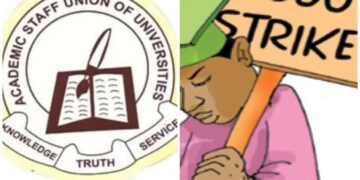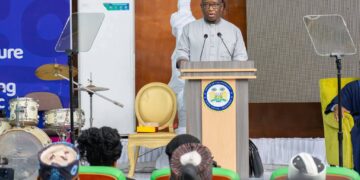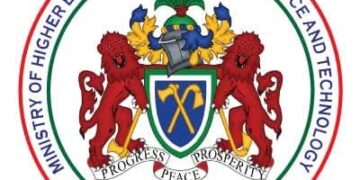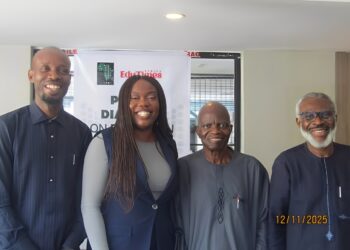And how well will you say the Nigerian school curriculum is doing to produce individuals who will either keep up with the new times or will themselves create those entirely new occupations sir?
One of the biggest questions facing schools right now is how to prepare students for the future labor market currently being restructured by emerging technologies such as Quantum computing and artificial intelligence, etc.? In a new report from the Economist Intelligence Unit, a research group affiliated with the weekly magazine, many K-12 educators said ‘they agree on the need and want to retool their teaching to match future workforce needs but feel limited by meager budgets and inadequate access to technology’. But there are also many other hidden and unaddressed reasons. Available records show that without changes in education, the future of work will leave more people behind the poverty line. Africa will need National STEM Policy and productive strategies for Upskilling Teachers, improving Communication and work messaging at all levels. Also, we need to retool and reequip our Education Infrastructure and teaching environment and tools with functional Laboratories if STEM Education must yield the quantum benefits to create wealth and sustainable knowledge value chain for our digital survivability. The future of work therefore will continue to challenge the world of learning which now witnesses tremendous change management requirements. Today, as we navigate deeper into the technology-driven ocean of the 21st century the art of learning will dictate the success of the 4th Industrial Revolution. For example, Future Schools may emerge in space very sooner than later. It simply means that more Nigerians and Africans will travel overseas to the UK, USA, Germany, Asia, and inevitably to Mars etc., to study and acquire new knowledge in the compressed technology frontier. Also, citizens of many nations of the world orbit into Space for new forms of complex knowledge and education. Those commanding new education models would be different from what is currently obtainable on Earth. It is instructive to note that future job terminologies will be different from today. For example, we expect to register:
AI Psychologists, Chief Geo-location Data Expert, Killer-Drone Directors, Mars Life Experts, Robotic Sociologists,
Mind-Messengers, Imagination-Preneurship, etc. Currently, there are many job openings out there, but no commensurate skills to fill them up. The national curriculum should focus on and ensure mandatory STEM (Science, Technology, Engineering and Mathematics) knowledge delivery from kindergarten to university levels and at all the tunnels of life-long learning. For example, the world of software is as vast as the oceans of food and drugs in the universe. Not only that, it has also become the center of gravity and sustainable blood that runs through the veins of our collective humanity connected by technology and the entire living environment. As Platforms grow, so will be the demand for Apps. To effectively manage our Bandwidth hungry desires and activities, it is expected that 60 million digital Apps will be required between 2024 and 2026. This makes migration to Internet Protocol version 6 (IPv6) critical.
Sir, Nigerian Fintechs seem to be doing quite well, even in an economy that apparently has the largest number of individuals living in abject poverty in the world. The global payment leader, Stripe, purchased the Nigerian start-up, Paystack for $200m in 2021 and we have Flutterwave, the largest African fintech company valued at $3 billion. The educational sector must be getting something right. Don’t you think, sir?
I agree that our education has been resilient to the dynamics of change at many levels. But we are still scratching the surface and I am personally disappointed that for the past 30 years, the neglect visited upon the education sector by several arms of government is monumental – citing the example of ASSU! My point is that Nigeria would have done about 1000-percent more, if leadership is conscious of the frightening magnitude of the challenges of nation building, especially when education is deprioritized! Lee Kwan Yew of Singapore turned Singapore around from ashes to monument by reimagining education. He drafted their teachers and practitioners of the education Community and empowered them to visit the best 50 Universities in the world in pursuit of drafting Singapore’s National Education and University Curriculum and related syllabus. This singular act moved Singapore from a third world country to a first world nation. With respect to Fintech, it is important to take a study-look at India which currently has 83 Unicorns. The total revenue generated by 66 Indian unicorns has crossed the mark of US$15 billion. Around 42% of these unicorns are generating a revenue of over $100 million.60% of these unicorns belong to the three verticals: FinTech, E-commerce, and SaaS. The cumulative funding raised by these unicorns till date stands at – US$ 51 billion. 18% of all unicorns have raised a funding of $1 billion individually. 50% of unicorns serve the B2B space, while 24% caters to B2C space (16% works for these sectors). Bengaluru has the maximum number of unicorns (1/3rd of the total unicorns), followed by the Delhi-NCR region. The cumulative employee strength in these unicorns is over 3.3 lakh, with seven unicorns having more than 10,000 employees each. Indian unicorns have gone through more than 500 rounds of funding till date. Currently, there are three decacorns in the country, namely Paytm, Flipkart, and Byju’s. Around 90% of these startups achieved unicorn status in 10 or fewer years, out of which 70% of startups became unicorns in less than five years. The above reference on India’s Tech ecosystem is powered by education provided by the India Institute of Technology – rated as perhaps the best Edu-Tech destination in the world. Today, products from India IT landscape head and run some of the best rated IT Mega-companies in the world… ranging from Apple, Google, FB, etc. It is instructive therefore to recognise the urgent need to transform IT and STEM education in Nigeria.
The Nigeria Start-up Act of 2022 is a joint initiative by the federal government and Nigeria’s tech startup ecosystem with the goal to make Nigeria the leading digital centre in Africa. The seed fund is expected to be N10 billion annually and The National Information Technology Development Agency (NITDA), which was created by the National Information Technology Policy, which you pioneered, will serve as the secretariat for the council set up to ensure the Act’s objectives are fulfilled. Sir, this all sounds very lovely and exciting but in reality how much difference will this initiative make assuming it’s well implemented?
First, the enactment of the Tech Startup Law is highly commendable. However, the magnitude of the Science and Technology challenges facing the Nigerian Nation remains grossly misunderstood. Expectations are that we need to do the followings to redeem the lost-time and glory of the IT Policy of 22 years ago and digital transformation where Education is the central pillar:
a. Establish the Office of the Information Technology General of the Federation
(OITGF).
b. Rebrand the defunct Nigeria Technical Peace Corps for Africa initiative into Nigeria Technology Innovation Corps for Africa (NTICA).
c. Establish 6 world class Institutes of Software Engineering in the six Regions of Nigeria —— regrettably, there is presently NONE in Nigeria! Whereas that is the cornerstone of technology strategy
d. Establish a 10 Year Tax-Free Technology Innovation Pioneer Status (from Startup to maturity state). All the above will rescue about 20 million Nigerians out of poverty and provide work for 40.2 million underemployed youths as well as create wealth.
e. Promote Technology empowerment for girls and women with STEM to maximize the promise,opportunities and benefits of Science and Technology for national prominence.
Sir, your laurels and accolades are so many. You have pioneered so many projects, organisations both in the public and private sector, and spearheaded so many policies too. You have won multiple awards both nationally and internationally. Tell us, which achievement are you most proud of?
Pioneering a technology frontier is with all sense of humility a cherished life achievement. Meanwhile, I must acknowledge and recognize the resilience of my amiable and inspirational wife (Karin) of 45 years in marriage, who against all odds accompanied me back to Nigeria and has been the amazing pillar and strong supporter of all my Technology endeavors. I owe and love her so much. And indeed, Nigeria owes her much more in her service and contribution as Past District President of International Inner Wheel – Nigeria. Her water-supply project for thousands of Nigeria School Children at Ajao Estate High School is a worthy accomplishment to behold. Thank you, Karin, my only and unforgettable Schnulla! All what I have accomplished today would not be possible without your incredible understanding and abundant love. Thank you, Karin, for being there for me ALWAYS.
I can’t help myself, I must ask you this sir. Have any of your children caught the IT bug and followed their father’s path?
God’s work is inspirationally wonderful and a complex DNA beyond human compression. To God be the glory. I am blessed with three Princesses, and they are all in the Technology Innovation Domain. I started exposing them to Technology-of-Things (ToT) – with particular reference to Software Coding, when the first Princess was 9 Years old. Today, my wife and I are eminently proud of their collective achievements. Three of them are global ICONs in their tech-fields. My joy and that of my charming wife are beyond earthly imagination and expression.
“THANK YOU ONCE AGAIN FOR THE OPPORTUNITY TO BE FOUND WORTHY TO CONTRIBUTE TO YOUR CEREBRAL INITIATIVE. NEEDLESS TO STATE: EDUTIMES HAS BUILT A NEW TECH- KNOWLEDGE FRONTIER – FROM ASHES TO MONUMENT. LEVERAGING TECHNOLOGY, YOU HAVE INVIGORATED AND ADDED IMMENSE VALUE TO THE EDUCATION ECOSYSTEM”.
_____________




















































































 EduTimes Africa, a product of Education Times Africa, is a magazine publication that aims to lend its support to close the yawning gap in Africa's educational development.
EduTimes Africa, a product of Education Times Africa, is a magazine publication that aims to lend its support to close the yawning gap in Africa's educational development.
